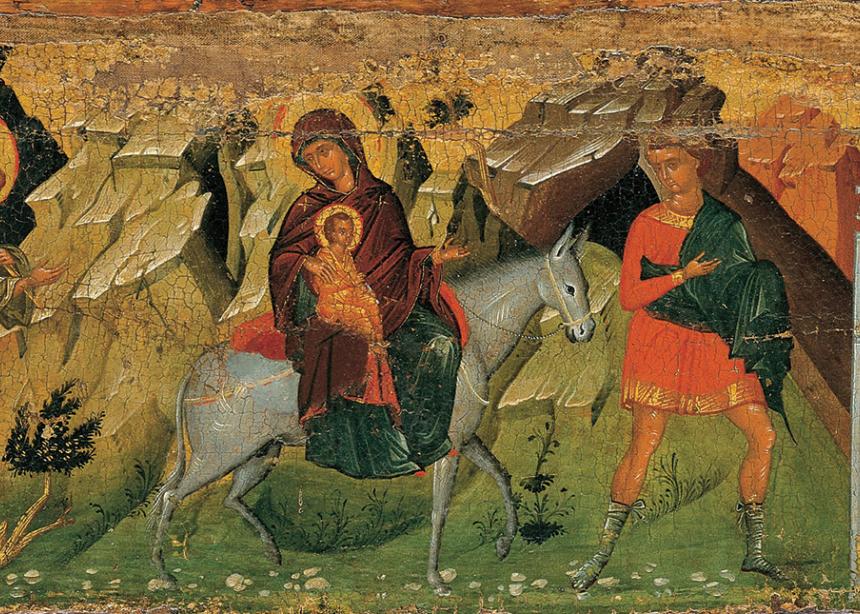“Are you ready for Christmas?”
The question came from Ed, a cheerful clerk at Save-On-Foods, as I was picking up some milk.
What kind of response was he seeking? Was he asking if I had I finished all my Christmas shopping? If so, the answer would be, yes, mostly, meager though my efforts are.
Or perhaps he was asking if I was “ready” for the crush of family and friends and parties and social obligations that the season often contains. Again, my response would fall into the rather muted “yes” category.
Maybe Ed was asking me a theological question. This seemed the least likely option of all. I doubt that he was pondering deep existential mysteries as he mechanically ran my milk and bananas across the scanner.
But what if Ed was wondering if I am “ready” for the coming of Christ into our world and all that this signifies? Could his question have been about the character of my longing, the shape of my hope?
Am I ready for the Christ child who came to initiate the great reversal of history—the lowly being lifted up, the proud being brought down?
Am I ready for peace on earth and goodwill to all? Am I ready for no more war, no more crazed school shootings, no more refugee crises that steal and destroy human life?
Am I ready for no more corrupt politicians and unjust economic policies, no more divisions based on things that should never divide human beings?
Am I ready for shalom: for swords being beaten into plowshares; for all people, from the greatest to the smallest, having God’s law written on their hearts?
Am I ready for a new heaven and a new earth, for the one who is making all things new to come again in glory? Am I ready for the hopes and fears of all the years to be met, once and for all?
O yes. I’m ready.
As it turned out, Ed was mostly interested in whether or not I had finished Christmas shopping. I forked over $10.28, wished Ed a Merry Christmas, and as I trudged out into the frozen parking lot I began to rethink my answer. Am I really as ready for the hope of Christmas as I think I am? The more I thought about it, the more I thought that, in addition to my eager “yes,” I must also answer “no.”
No, I’m not ready for Christmas. I’m not ready for the coming of Jesus that exposes and judges and purifies and refines.
My heart is not prepared for this child who unsettles and upends and divides. I still cling too tightly to cherished sins, to preferred means of deriving identity and value through things that are passing away.
Too often I am not an instrument of peace. Too often I domesticate Christ and his coming, treating it as little more than a pleasant holiday with lights and cheer and cookies and parties, rather than the beginning of the end of the world as we know it, the beginning of God’s revolutionary project of healing, judging, forgiving, reclaiming and renewing the world. No, at the deepest level, I am probably not ready for Christmas. Not as ready as I should be.
The ‘overturning’ God
“Look, the virgin shall conceive and bear a son, and they shall name him ‘Emmanuel,’ which means, ‘God is with us’ ” (Matthew 1:23).
The incarnation—God taking on human flesh in Jesus—is, and has been, a source of enormous comfort and consolation to Christians for the past two thousand years.
A God who would enter into our experience, who would take on our flesh, who would understand what it means to be human on a deep and personal level—this is good news.
But the incarnation is about more than a divine humanity-affirming hug.
I like how Skye Jethani puts it in his appropriately titled book, With: “[God’s] plan to restore his creation was not to send a list of rules and rituals to follow . . . nor was it the implementation of useful principles. . . . He did not send a genie to grant us our desires . . . nor did he give us a task to accomplish. . . . Instead, God himself came to be with us—to walk with us once again as he had done in Eden in the beginning. Jesus entered into our dark existence to share our broken world and to illuminate a different way forward. His coming was a sudden and glorious catastrophe of good.”
What a phrase: “glorious catastrophe of good.” We usually think of a catastrophe as something terrible, like an earthquake or an accident, or some sudden and dramatic tragedy.
But the origins of the Greek word simply mean “overturning.”
When God comes to be with us, things don’t always look like we imagine they ought to. But there are some things that need to be overturned, some patterns that have to be changed.
“God with us” is all about leading to “us with God.” And this doesn’t always happen how we think it should.
We see this in the lives of Mary and Joseph. At this time of year, we often gaze at idyllic manger scenes with peaceful Mary and the baby Jesus that conjure up emotions of hope and promise and contentment. “God with us” was good news, certainly, but “with” also meant a young couple running for their lives as refugees not long after this baby boy of promise was born. And as Simeon predicted, for Mary, “with” meant that a sword would pierce her soul; the baby boy who was Emmanuel would one day make her weep as he hung on a Roman cross.
And for Joseph, God “with” us would look like a parental relationship that began in scandal, an adopted baby boy who would probably always be a bit of an enigma to him.
I can only imagine what Mary and Joseph thought as Jesus said: “Who is my mother, and who are my brothers?” And pointing to his disciples, he said, “Here are my mother and my brothers! For whoever does the will of my Father in heaven is my brother and sister and mother” (Matthew 12:47-50).
And, of course, Mary and Joseph’s people—the people of Israel—would have preferred “God with us” to look a little more victorious and triumphant than the way Jesus’ story ultimately unfolded. Nobody imagined that “with” would involve a cruel and humiliating execution. Or a glorious and death-defeating resurrection! God with us really would be destined for the rising and falling of many in Israel, as Simeon predicted.
For these reasons and countless others, the son that Mary and Joseph were to name “Emmanuel” would indeed be the fulfillment of the hopes and fears of all the years, but not in the way they or anyone else expected.
As we prepare to head out into the Christmas season, I want to encourage us to reconsider what “with” looks like. Does “with” mean comfort? Rebuke? Guidance? Deliverance? Encouragement? Hope? Abiding joy and depth of purpose? Might “with” look like a hard road ahead, one that will test you and force you to grow and change and re-examine priorities? Is it possible that “with” will look like shared suffering?
I want you to think about the ways that God has been and is with you now.
I want to encourage you to think about the ways in which God has been saying to you what he said to both Mary and Joseph in dreams and visions: “Do not be afraid.”
I want you to consider how God is inviting you into a deeper experience of his presence, and shaping you according to his character and purposes in the world, even if in completely unexpected and unimaginable ways.
After all, this is how God works in the world, and why God works in the world.
If there’s one thing that Christmas reveals to us, it’s that God’s coming cannot be managed or that it’s not what many of us would have predicted, but that God is always with us in the manner most appropriate to our need.
The question the coming of Christmas invites us into is: “Will we be ‘with’ the God who comes to be ‘with’ us?”
God doesn’t wave a wand at Christmas and magically bring about lions and lambs and all the other magnificent visions of the prophets. God works slowly, patiently, long-sufferingly, collaboratively. He enters our experience and involves us in the process, inviting us to be with him and he with us.
And to be with God means to become like God, which takes time. The character of Christ is not formed in us overnight. It takes a lot of God with us with God.
So I end with the question Ed asked me: “Are you ready for Christmas?”
We answer, as always, with our lives. We declare our readiness for “God with us” by our willingness to be “with God,” to allow our lives to be overturned and upended by Christmas’s “glorious catastrophe of good.”
Ryan Dueck is pastor of Lethbridge (Alta.) Mennonite Church. This feature is adapted from a sermon he preached there on Dec. 18, 2016.
For discussion
1. How do you respond when you are asked if you are ready for Christmas? Do you enjoy the flurry of activities and decorations connected with the Christmas season or do you wish for a simpler way to celebrate “God with us”? What does it mean to be “ready for Christmas”?
2. Ryan Dueck writes, “When God comes to be with us, things don’t always look like we imagine they ought to.” How was this true in Jesus’ day? How is it true today?
3. “As we prepare to head out into the Christmas season, I want to encourage us to reconsider what ‘with’ looks like,” Dueck writes. What does “God with us” mean for you? Do you expect it to bring guidance and comfort, rebuke or even suffering? Have you experienced God working “slowly, patiently, long-sufferingly, collaboratively”?
3. How has God been with you in the past, and how is he with you now? Have you ever experienced a catastrophe that turned into something good? Have you heard God say, “Do not be afraid”?
—By Barb Draper






Comments
Hello Ryan Dueck, my name is Halle Dyck and I read your article and I have a few comments.
I agree with what you are saying about how Jesus came into this world and changed everything in a good way. Also I found it very interesting how you mentioned the coming of Christ as a “glorious catastrophe of good.” I had never thought of a catastrophe as being a good thing but I think that describes the situation perfectly.
In your article you claimed that to be with God we have to become more like God but Hebrews 13: 5 says “Never will I leave you; never will I forsake you.” This verse states that God is always with us no matter what, even if we aren't perfect or “God-like.” I believe that the statement “God with us” doesn't mean that he is ever physically with us. It means that he is always with us in our hearts and is always there for us when we need. So that means that when Jesus died on the cross it didn't make that statement wrong but rather it enforced it more because he died for our sins and to be with us in our hearts forever.
I enjoyed the part of your article where you challenge us to think about what the word “with” means. I believe that the word “with” means all of those things you mentioned and when God is with us all things are possible.
Overall I really enjoyed reading your article and it helped me to think about things in a different way than I normally would.
Add new comment
Canadian Mennonite invites comments and encourages constructive discussion about our content. Actual full names (first and last) are required. Comments are moderated and may be edited. They will not appear online until approved and will be posted during business hours. Some comments may be reproduced in print.